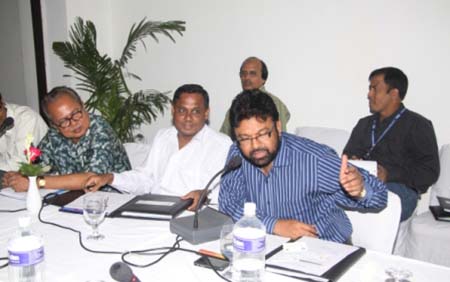Modhumita Program
Modhumita Program to create a Fairer Future for HIV/AIDS Affected Individuals
 With the title Modhumita, Sweet Friend, a project was initiated by FHI 360, a global health and development organization, to follow up the Bangladesh AIDS Program of USAID. The program is implemented by FHI360 in partnership with BCCP and SMC. Aiming to prevent HIV and tackle the discrimination faced by many that are affected, Modhumita aims to improve prevention, care, and treatment services for most-at-risk population, as well as strengthening government leadership, multi-level coordination and the use of data for decision-making, knowledge and advocacy to aide existing HIV prevention interventions.
With the title Modhumita, Sweet Friend, a project was initiated by FHI 360, a global health and development organization, to follow up the Bangladesh AIDS Program of USAID. The program is implemented by FHI360 in partnership with BCCP and SMC. Aiming to prevent HIV and tackle the discrimination faced by many that are affected, Modhumita aims to improve prevention, care, and treatment services for most-at-risk population, as well as strengthening government leadership, multi-level coordination and the use of data for decision-making, knowledge and advocacy to aide existing HIV prevention interventions.
Media Advocacy
Since media hugely influences public perception, a media forum was formed where various issues were discussed including ways of sensible reporting of HIV and AIDS issues, guidance for journalists on reporting these issues on various media, providing them with appropriate and sufficient information, involving young journalists in media reporting, etc. A meeting was held on 29 May, 2011 with the Head of News from 16 renowned print and electronic media as these can play a role in advocacy initiatives and for mass people mobilization. A two day orientation program was also organized to provide journalists with an insight into HIV and AIDS related issues.
A total of 14 articles were published in different leading dailies, including Daily Ittefaq, Daily Samakal, Daily Jugantor, on stigma and discrimination towards Injecting Drug Users (IDUs), transgender, sex workers, as well as five special news features and talk shows highlighting various aspects that surround HIV affected people.
Policy Advocacy
To strengthen policy-level advocacy in program integration and resource mobilization, several meetings were held with HIV focal persons of the different ministries of the Government of Bangladesh, including Ministry of Health and Family Welfare, and involved in mainstreaming of HIV, developing coordination of HIV interventions, and recognition of barriers to interventions.
The Department of Women Affairs had a discussion on 20 February, 2011 to discuss collaborative work for mainstreaming HIV and AIDS. Some program interventions were identified where Modhumita could work in collaboration, for instance capacity building of theDepartment of Women Affairs, establishing referral linkage with the service delivery sites and VCT, as well as providing IEC materials on HIV and AIDS as a source of information.
The Directors and Program Heads of the Department of Social Services (DSS) were briefed on 31 April, 2011 about the mainstreaming efforts of Modhumita and integration opportunities for their existing HIV prevention programs. Again, some areas were identified where BCCP could collaborate through capacity building, establishing referral linkage with the service delivery sites and VCT, organizing enter-educate and life skills training for the field based programs, and finally producing IEC materials for use in relevant programs
The HIV focal person of Youth, Ministry of Youth and Sports, the Deputy Chief, was invited to a one to one meeting to discuss the activities that could be considered for mainstreaming, and the DG of Department of Youth to discuss potential collaboration, especially for capacity building of recovery youth IDUs as a part of their rehabilitation.
Countrywide Use of Modules/Guidelines Developed Under BAP
To review the STI clinical curriculum for targeted intervention, a meeting was held with 19 experts from different organizations, followed by another meeting whereby National AIDS/STD Program (NASP), various NGOs and development partners discussed the findings and identified different sections of the module that need modifications.
Advocacy for the Regulation of Private Sector Drug Treatment Services and Collaboration Resolution Related Legal Issues
Since law enforcement agencies (LEAs) can discriminate against HIV and AIDS affected people, a meeting was held with the Additional Police Commissioner to establish a linkage between thana and community, by forming Community Facilitation Committee (CFC) to reduce harassment of IDUs and ensure access to rehabilitation. A few CFC meetings were held in police stations with officials of the respective thana, ward commissioners, community leaders and counselors to discuss raising awareness and collaborative work with the local thana. Furthermore, to overcome barriers in implementing HIV prevention and care program created by LEAs, BCCP organized a meeting with HIV focal person of the Ministry of Home Affairs to discuss these issues.
With the aim of strengthening service standard of drug treatment and rehabilitation centers of Bangladesh, Director General (DG) of the Department of Narcotics Control (DNC), Director (Treatment) of DNC, and other respective officials of the narcotics department suggested organizing a technical session on standardization of the treatment procedure of rehabilitation.Furthermore, a workshop was organized to analyze what modifications are needed in terms of the existing laws related to drug treatment, the service providers and the treatment of the drug users themselves.
BCCP provided management and technical support to a HIV and AIDS Prevention Program of NASP and coordinated similar programs of other organizations in a synergistic manner whilst avoiding duplication. A range of advocacy materials were also developed by BCCP along with NASP to reduce stigma and discrimination.
Believing that every individual should have access to health services and be fairly treated, BCCP has been very active in providing its innovative, expert methods of communication and supported implementation of Modhumita to ensure a promising future for most at risk populations including HIV and AIDS affected individuals in Bangladesh.
